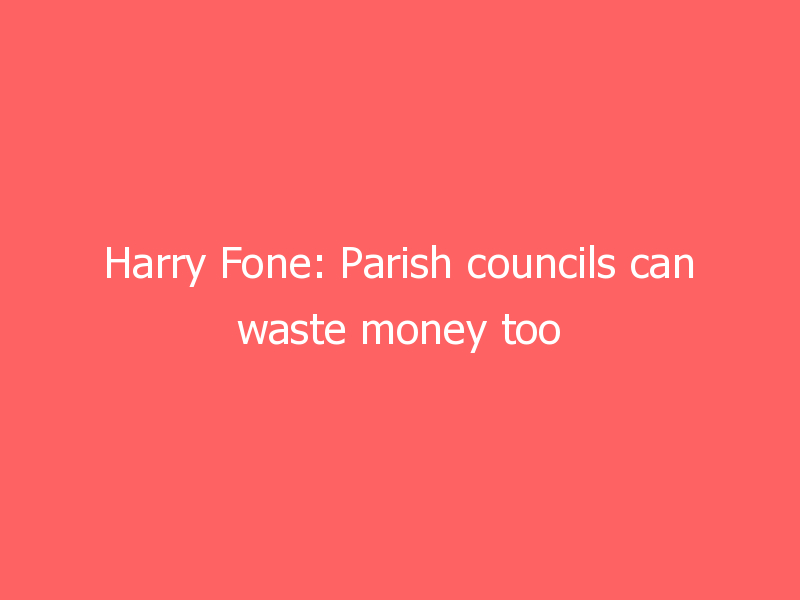Harry Fone is the Grassroots Campaign Manager for the TaxPayers’ Alliance.
The TaxPayers’ Alliance is well-known for scrutinising spending in the higher tiers of local government such as unitary, county, and city councils. However, over the past few weeks my inbox has been inundated with emails from concerned ratepayers detailing the largesse of their parish and town councils.
These lowest tier authorities are typically not subjected to the same rigour and scrutiny as their larger counterparts – they are not in the scope of the Local Government and Social Care Ombudsman, for example. Indeed, this makes a lot of sense; odds are it would not be efficient to constantly monitor all of England’s approximately 10,000 parish and town councils.
But that doesn’t mean they should be able to get away with wasteful and inefficient spending. For the current financial year, 2020-21, £596 million will be raised through parish precepts which is £42 million higher than the previous year. Based on a band D property, the highest precept was £334.96 (Bodmin) and the lowest just £0.27 (Surfleet).
On average, the charge is £69.89 which may seem small when compared to four-figure council tax bills. But try telling that to a family on a low income – it’s enough to pay for a week’s worth of food. Add to this the parlous state of the country’s finances and every penny of public money matters.
On one end of the scale, Chearsley Parish Council in Buckinghamshire is set to purchase 10 high visibility jackets to be customised with the embroidery of the village emblem at a total cost of £540. Is it necessary that the emblem be added to the jackets? The same number of ‘non-emblemed’ jackets would only cost £200.
Again, critics will argue that such spending is trivial when compared to the millions and billions wasted by successive governments. Whilst true, what really enrages ratepayers is the seemingly thoughtless attitude towards their hard-earned taxes. How can we trust public officials and elected representatives to look after the pounds if they can’t look after the pennies?
At the other end of the scale, just like their larger counterparts, parish councils are borrowing large sums from the Public Works Loan Board (PWLB). Between 2015 and 2020 parish and town councils took out loans totalling £106.5 million. In the last two years alone that figure is £53.9 million across 180 councils. Ten parishes borrowed £1 million or more.
The loans can be used for a variety of reasons – Huntingdon Town Council borrowed £6.7 million to fund construction of a crematorium. Some parishes are engaging in commercial ventures. Pailton Parish Council in Warwickshire has borrowed £525,000 from the PWLB to try and resurrect its village pub which has been closed since 2013. £250,000 was used to purchase the pub and the remaining cash to cover the costs of refurbishment. The council’s business plan states the risk of the venture failing is low because they “visited & corresponded with other local establishments, who are doing very well.” – sounds like they enjoyed a good pub crawl to me.
Just like we have seen in Croydon and Nottingham if the investment isn’t profitable, residents will end up footing the bill through higher taxes. An extraordinary general meeting of Pailton council revealed that the precept would have to increase by £107.23 (Band D) if the business gamble failed – a rise of 161 per cent. Such a huge hike would not require a referendum. Currently, there is no cap on increases for parish and town councils – although the government is set to revisit the issue in the near future after attempting to introduce legislation in 2016.
Not all parishes charge a precept though. Around 1,000 are so-called “non-precepting parishes” and raise revenue through other means such as car parking charges, room hire, and even local lotteries. Perhaps more should use these methods. After all, they could be considered a form of voluntary taxation and might even raise more funds. Parishes might also be discouraged from borrowing huge sums of money for risky investments. The removal of the precept, a virtually guaranteed source of income, could well lead to greater fiscal prudence.
It must be said that parish and town councils play an important role in the upkeep of an area and ensuring that residents’ needs are met. Likewise, I suspect that in the majority of cases most are well run with sound finances. But based on the examples above and with tens of millions of pounds in borrowed cash at stake, I suspect many ratepayers will wonder if more oversight is needed.
Originally found on Conservative Home Read More







